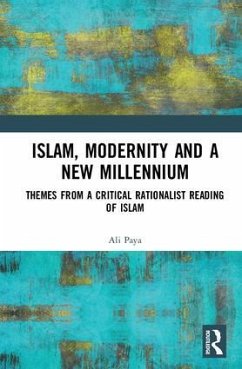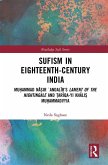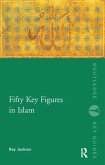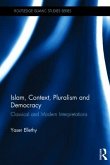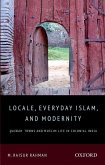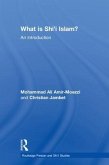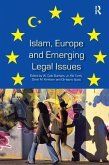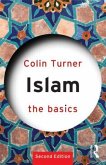- Gebundenes Buch
- Merkliste
- Auf die Merkliste
- Bewerten Bewerten
- Teilen
- Produkt teilen
- Produkterinnerung
- Produkterinnerung
This book utilizes a critical rationalist viewpoint to illuminate many of the hotly contended issues in modern Islam. In each case, the author makes use of Karl Popper's theory of critical rationalism to uncover new aspects of these issues and to challenge post-modern, relativist, literalist and justificationist readings of Islam.
Andere Kunden interessierten sich auch für
![Sufism in Eighteenth-Century India Sufism in Eighteenth-Century India]() Neda SaghaeeSufism in Eighteenth-Century India149,99 €
Neda SaghaeeSufism in Eighteenth-Century India149,99 €![Fifty Key Figures in Islam Fifty Key Figures in Islam]() Roy JacksonFifty Key Figures in Islam46,99 €
Roy JacksonFifty Key Figures in Islam46,99 €![Islam, Context, Pluralism and Democracy Islam, Context, Pluralism and Democracy]() Yaser EllethyIslam, Context, Pluralism and Democracy178,99 €
Yaser EllethyIslam, Context, Pluralism and Democracy178,99 €![Locale, Everyday Islam, and Modernity Locale, Everyday Islam, and Modernity]() M Raisur RahmanLocale, Everyday Islam, and Modernity50,99 €
M Raisur RahmanLocale, Everyday Islam, and Modernity50,99 €![What is Shi'i Islam? What is Shi'i Islam?]() Mohammad Ali Amir-MoezziWhat is Shi'i Islam?167,99 €
Mohammad Ali Amir-MoezziWhat is Shi'i Islam?167,99 €![Islam, Europe and Emerging Legal Issues Islam, Europe and Emerging Legal Issues]() W. Cole DurhamIslam, Europe and Emerging Legal Issues177,99 €
W. Cole DurhamIslam, Europe and Emerging Legal Issues177,99 €![Islam Islam]() Colin TurnerIslam21,99 €
Colin TurnerIslam21,99 €-
-
-
This book utilizes a critical rationalist viewpoint to illuminate many of the hotly contended issues in modern Islam. In each case, the author makes use of Karl Popper's theory of critical rationalism to uncover new aspects of these issues and to challenge post-modern, relativist, literalist and justificationist readings of Islam.
Produktdetails
- Produktdetails
- Verlag: Routledge
- Seitenzahl: 286
- Erscheinungstermin: 15. Februar 2018
- Englisch
- Abmessung: 240mm x 161mm x 20mm
- Gewicht: 596g
- ISBN-13: 9781138087750
- ISBN-10: 1138087750
- Artikelnr.: 51387781
- Herstellerkennzeichnung
- Libri GmbH
- Europaallee 1
- 36244 Bad Hersfeld
- gpsr@libri.de
- Verlag: Routledge
- Seitenzahl: 286
- Erscheinungstermin: 15. Februar 2018
- Englisch
- Abmessung: 240mm x 161mm x 20mm
- Gewicht: 596g
- ISBN-13: 9781138087750
- ISBN-10: 1138087750
- Artikelnr.: 51387781
- Herstellerkennzeichnung
- Libri GmbH
- Europaallee 1
- 36244 Bad Hersfeld
- gpsr@libri.de
Ali Paya is a Professor in the Department of Philosophy at the Islamic College London, UK. He is also a Visiting Professor at the Institute for the Study of Muslim Civilisations (UK) and Azad University (Iran). He has published widely on modern Islam including the book Iraq, Democracy, and the Future of the Muslim World (2012) and The Misty Land of Ideas and the Light of Dialogue: An Anthology of Comparative Philosophy- Western & Islamic (2013). He is on the editorial board for the Journal of Dialogue Studies, Journal of Shi'a Islamic Studies and International Journal of Islam.
1 Introduction 2 What and how can we learn from the Quran? A critical
rationalist perspective 3 A critical rationalist approach to religion 4 A
critical assessment of the programmes of producing 'Islamic Science' and
'Islamisation of Science/Knowledge' 5 Faqih as engineer: a critical
assessment of Fiqh's epistemological status 6 A critical assessment of the
method of interpretation of the Quran by the Quran, in the light of Allameh
Tabatabaei's Tafsir al-Mizan 7 The disenchantment of reason: an
anti-rational trend in modern Shi'i thought - the Tafkikis 8 Islamic
philosophy: past, present and future 9 Doctrinal certainty: a major
contributory factor to 'Secular' and 'Religious' violence in the political
sphere 10 Islam, Christianity and Judaism: can they ever live peacefully
together? 11 The shape of the coming global civil society: suggestions for
a possible Islamic perspective
rationalist perspective 3 A critical rationalist approach to religion 4 A
critical assessment of the programmes of producing 'Islamic Science' and
'Islamisation of Science/Knowledge' 5 Faqih as engineer: a critical
assessment of Fiqh's epistemological status 6 A critical assessment of the
method of interpretation of the Quran by the Quran, in the light of Allameh
Tabatabaei's Tafsir al-Mizan 7 The disenchantment of reason: an
anti-rational trend in modern Shi'i thought - the Tafkikis 8 Islamic
philosophy: past, present and future 9 Doctrinal certainty: a major
contributory factor to 'Secular' and 'Religious' violence in the political
sphere 10 Islam, Christianity and Judaism: can they ever live peacefully
together? 11 The shape of the coming global civil society: suggestions for
a possible Islamic perspective
1 Introduction 2 What and how can we learn from the Quran? A critical rationalist perspective 3 A critical rationalist approach to religion 4 A critical assessment of the programmes of producing 'Islamic Science' and 'Islamisation of Science/Knowledge' 5 Faqih as engineer: a critical assessment of Fiqh's epistemological status 6 A critical assessment of the method of interpretation of the Quran by the Quran, in the light of Allameh Tabatabaei's Tafsir al-Mizan 7 The disenchantment of reason: an anti-rational trend in modern Shi'i thought - the Tafkikis 8 Islamic philosophy: past, present and future 9 Doctrinal certainty: a major contributory factor to 'Secular' and 'Religious' violence in the political sphere 10 Islam, Christianity and Judaism: can they ever live peacefully together? 11 The shape of the coming global civil society: suggestions for a possible Islamic perspective
1 Introduction 2 What and how can we learn from the Quran? A critical
rationalist perspective 3 A critical rationalist approach to religion 4 A
critical assessment of the programmes of producing 'Islamic Science' and
'Islamisation of Science/Knowledge' 5 Faqih as engineer: a critical
assessment of Fiqh's epistemological status 6 A critical assessment of the
method of interpretation of the Quran by the Quran, in the light of Allameh
Tabatabaei's Tafsir al-Mizan 7 The disenchantment of reason: an
anti-rational trend in modern Shi'i thought - the Tafkikis 8 Islamic
philosophy: past, present and future 9 Doctrinal certainty: a major
contributory factor to 'Secular' and 'Religious' violence in the political
sphere 10 Islam, Christianity and Judaism: can they ever live peacefully
together? 11 The shape of the coming global civil society: suggestions for
a possible Islamic perspective
rationalist perspective 3 A critical rationalist approach to religion 4 A
critical assessment of the programmes of producing 'Islamic Science' and
'Islamisation of Science/Knowledge' 5 Faqih as engineer: a critical
assessment of Fiqh's epistemological status 6 A critical assessment of the
method of interpretation of the Quran by the Quran, in the light of Allameh
Tabatabaei's Tafsir al-Mizan 7 The disenchantment of reason: an
anti-rational trend in modern Shi'i thought - the Tafkikis 8 Islamic
philosophy: past, present and future 9 Doctrinal certainty: a major
contributory factor to 'Secular' and 'Religious' violence in the political
sphere 10 Islam, Christianity and Judaism: can they ever live peacefully
together? 11 The shape of the coming global civil society: suggestions for
a possible Islamic perspective
1 Introduction 2 What and how can we learn from the Quran? A critical rationalist perspective 3 A critical rationalist approach to religion 4 A critical assessment of the programmes of producing 'Islamic Science' and 'Islamisation of Science/Knowledge' 5 Faqih as engineer: a critical assessment of Fiqh's epistemological status 6 A critical assessment of the method of interpretation of the Quran by the Quran, in the light of Allameh Tabatabaei's Tafsir al-Mizan 7 The disenchantment of reason: an anti-rational trend in modern Shi'i thought - the Tafkikis 8 Islamic philosophy: past, present and future 9 Doctrinal certainty: a major contributory factor to 'Secular' and 'Religious' violence in the political sphere 10 Islam, Christianity and Judaism: can they ever live peacefully together? 11 The shape of the coming global civil society: suggestions for a possible Islamic perspective

